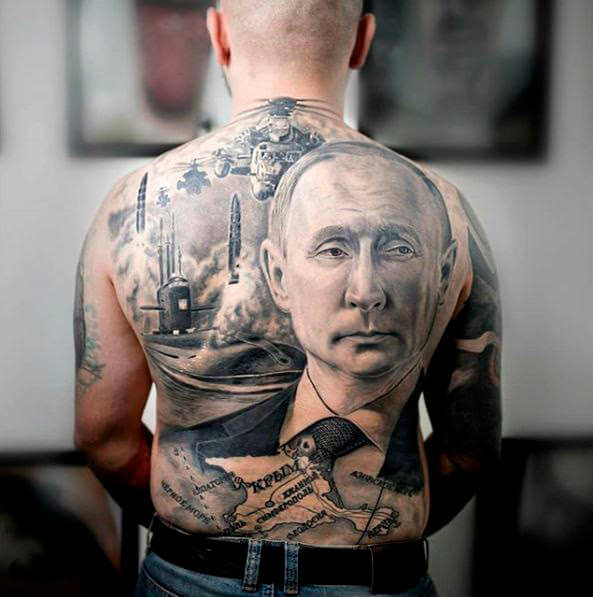In a week, Putin will once again wave the paper saying that he is the only legal heir to the victor over Nazism. When he greets the troops on Red Square on May 9, he will be satisfied. The parade will remind the whole world that he and his Russia are the only remaining guardians of the flame of freedom from 1945, and that everyone else betrayed them. The old uniforms and flags of the Red Army battalion at the parade will mean that this Russia and this leader inherited the only thing that was good from the USSR, the victory over Nazism.
As flashy as it may be, the upcoming parade will, in fact, be just a theater celebrating lies and crime, which was decided on February 24. It will be a festival of false representation of an armed mythomaniac, who boasts of a squandered legacy. He did not inherit the family coat of arms of the victor over fascism from the USSR. He showed that by invading Ukraine with the intention of occupying it and abolishing its people.
However, he was left with something else from the USSR, similar to a hereditary disease. In the absence of a good translation into Serbian, we will stick to English – “whataboutism”. It’s when you tell the Soviets or the Russians that they did something wrong, and they retaliate – You did the same thing, even worse. Like in a Cold War joke when an American guest asks his Moscow hosts why the subway is so late, and they angrily answer – And why did you exterminate the Indians?
Putin waited for the moment to use his inherited “whataboutism” on an important occasion, in a conversation with UN Secretary General Guterres, where he responded to the scolding that he occupies foreign countries with – Donetsk and Luhansk did the same as Kosovo. It’s not his first time. Whenever he had the opportunity, he took Kosovo as an excuse for his aggressive actions, especially after the annexation of Crimea. He copied all decisions on the recognition of Donetsk and Luhansk as independent states from his own decision to invade Georgia in 2008 and recognize the independence of Abkhazia and South Ossetia, and he copied those decisions from all states that recognized Kosovo.
For Putin and Russia, Kosovo has never been a matter of principle. It has always and exclusively been a precedent for redrawing borders, which they will use someday. And they used it many times. And providing protection to Serbia, in connection with Kosovo, has never been friendship and alliance, but racketeering. I guess that finally became clear after Putin’s conversation with Guterres.
When Maria Zakharova recently threatened Serbia and President Vučić not to impose sanctions on Russia, she mentioned the friendship that the Russians hold and was afraid that “we do not understand it in the same way”. True, we do not understand it in the same way, and that was best shown by her leader in a conversation with Guterres.
Srebrenica, like Kosovo, is a favorite “whataboutism” for Putin and his people, whenever they need to justify their offensives, aggressions, invasions. Back in 2008, Sergey Lavrov justified the aggression against Georgia in the Wall Street Journal by saying that Russia “cannot allow acts of genocide, as was the case in 1995 in the Bosnian city of Srebrenica”. After him and Putin – 2017, 2019 and on the eve of the attack on Ukraine, his officials Peskov and Kozak repeatedly said that genocide took place in Srebrenica and that they do not want it to happen to their people, wherever they live.
And who is a friend to whom here? Such a Russia to Serbia or Ukraine is a true friend, whose territory is falling apart, which does not recognize the independence of Kosovo and warns that Donbass and Crimea violate international law just like Pristina, only with Russian support.
There is no way for Russia to ever again present itself to Serbia as a friend and ally after Putin’s “outing” before the UN Secretary General. Even if we forget all the previous ones, which were heard in Serbia and immediately erased from memory, believing in “eternal friendship”. The only thing behind the Kremlin’s sweet talk was always interest. And let’s forget the underestimation, espionage of Serbia and open ridicule of its president by Maria Zakharova, when Vučić “dared” to travel to Washington and meet the President of the United States.
Serbia’s interests are the only important ones for Serbia, and now they do not coincide in any way with Russia’s interests. Quite the opposite, every current interest of Russia directly harms the interests of Serbia, and it has an obligation to turn around and look after itself. It is not only a matter of interest, but also the moral attitude of a nation to oppose evil, violence and crime. No one has the right to make Serbia an accomplice of Putin and a hostage of the wrong side of history. Kaja Kallas, Prime Minister of Estonia, a country much smaller than Serbia, but also much more endangered by Russia and its interests, quoted the courageous moral lesson of Garry Kasparov – “The price of stopping a dictator always goes up with every delay and every hesitation. Meeting evil halfway is still a victory for evil”. And since her country stopped importing Russian gas, she added – gas is expensive, but freedom is priceless.
Serbia has no room to make the wrong choice. For the first time Serbia is in the historical situation that its possible choice stood out from the competition. Russia crossed itself out as Serbia’s choice as soon as its first soldier stepped on Ukrainian soil. Anything further about Russia protecting some Serbian interests, including those around Kosovo, has become meaningless and insulting, and anyone who continues to claim that will represent the interests of Russia, not Serbia. Putin will not deny it.
